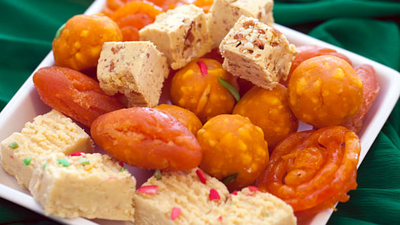ARTICLE AD BOX

The festive season often brings a cycle of extreme dieting and overindulgence, fueled by pervasive myths that promise quick fixes but ultimately lead to guilt and metabolic stress.
As a nutritionist, my advice is to stop believing these common misconceptions and adopt a more mindful approach to moderation instead, says Dr Archana Batra, Dietitian and Certified Diabetes Educator.
Myth 1: You must "detox" before or after the feast
The idea that you need juice fasts or radical cleansing programs before or after Diwali is false. Your body has a built-in detoxification system, consisting of your liver and kidneys. Juice fasts are severely deficient in protein and fibre, spiking blood sugar and leaving you weak and susceptible to illness, which is the opposite of what you need during a high-stress festive period.The reality: The best "detox" is drinking plenty of water and consistently eating fibre (fruits, vegetables, and whole grains) and protein.
Myth 2: Skipping meals to "save calories" for the feast works
Skipping breakfast or lunch to save hundreds of calories for a big evening party is a recipe for disaster. This strategy causes a significant drop in blood sugar, triggering intense hunger and a primal drive to overeat later. When you finally sit down, you’ll consume far more refined carbohydrates and sugary items than you would have otherwise, often leading to rapid fat storage.
The reality: Eat a balanced, high-protein breakfast and a light, fibre-rich lunch on party days. This stabilises your blood sugar, enhances satiety, and allows you to enjoy the feast with control.
Myth 3: Zero-sugar sweets are always healthier
While choosing a sweet with less refined sugar seems smart, many store-bought "zero-sugar" or "diet" sweets rely heavily on refined flour, unhealthy trans fats, and artificial sweeteners. These ingredients can still contribute to inflammation, metabolic confusion, and digestive distress.The reality: Prioritise quality over quantity. Choose traditional sweets made with wholesome ingredients, such as ghee and jaggery (in moderation), or opt for homemade sweets using natural sweeteners like dates or figs. Enjoy a small piece of something authentic rather than a large portion of a chemically-altered alternative.
Myth 4: You must do extreme workouts to "earn" your feast
Trying to "burn off" the extra calories with hours of intense cardio is mentally draining and physically unsustainable.
Exercise is for fitness and health, not punishment for eating. Extreme, sudden spikes in exercise can lead to injury and burnout.The reality: Focus on consistency. Maintain your regular exercise routine. Even a 20-30 minute brisk walk before or after a meal is excellent for blood sugar management and digestion. View movement as a tool to feel energized, not as a debt repayment system.
Myth 5: You must completely avoid all fried foods
Completely restricting highly anticipated festive foods is often counterproductive, leading to intense feelings of deprivation and eventually a large binge.
You can enjoy puris and samosas without derailing your diet.The Reality: Practice the 80/20 rule. If 80% of your day is dedicated to whole foods, water, and movement, the 20% dedicated to festive treats won't matter. Have one small, high-quality fried snack and truly savor it, rather than eating five mindlessly. The goal is to nourish the body while celebrating the spirit of the season.

 11 hours ago
3
11 hours ago
3









 English (US) ·
English (US) ·